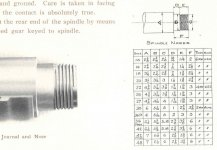Pattnmaker
Stainless
- Joined
- Nov 2, 2007
- Location
- Hamilton, Ontario
I am designing a new fixture for my shop that may become a product. I will have a collar that has to thread onto a flange. The threads will be threaded on and off hundreds or even thousands of times. I would like to make the fixture out of aluminum, I am thinking 6061 hard anodized? I would like the thread to start easily as the collar will be in an awkward position to tighten and the thread will often be started with a wrench. Gravity will hold things together while the threads are tightened so they don't need a lot of pull. I am thinking a multi start thread might be a good way to go as I won't need as much of a turn to start the thread, I don't want a lot of turns to tighten the collar.
What sort of thread would be good for this application?
What sort of thread would be good for this application?



